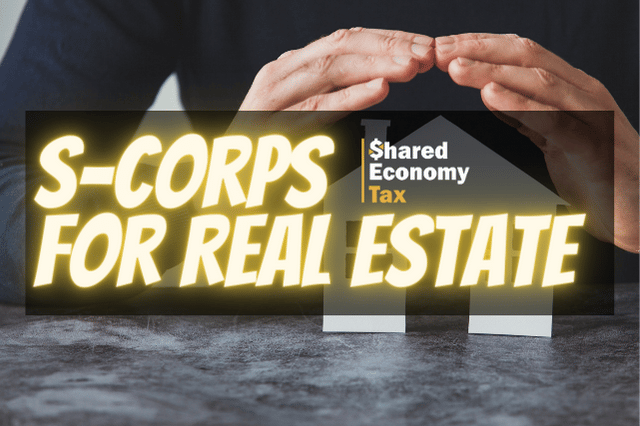Real estate can be a great investment, but it also comes with some risks. Along with the financial risks of rental property, owning real estate may open you up to potential liability. Owning the property through a company can protect your other assets, but does an S-corp for real estate holdings make sense?
S-Corps and Real Estate: The Basics
Investors use holding companies to maintain real estate ownership through a separate entity to limit their personal liability. S-corps fill this need by providing liability protection for shareholders, but they have some limits. More on that later.
S-corps can also help investors avoid double taxation on their rental income. Any profit or loss passes through to shareholders, so there’s no federal tax at the corporate level. However, some states impose a tax on S-corporate profits.
S-Corp Benefits for Real Estate Investors
As already noted, S-corps provide liability protection and avoid double taxation, but they also have other potentially beneficial features.
An s-corporation can have up to 100 shareholders, and they can buy or sell shares without changing the property’s title. However, S-corps only allow one class of stock, so any distributions must be proportionate to ownership share.
S-corporations allow shareholders to receive salaries. So, if an investor actively manages any property, they can receive W-2 wages for their services.
The Problem with S-Corps for Real Estate
The S-corporate structure has some benefits for real estate investors, but it has many more drawbacks.
Complicated Compliance
A “corporate shield” or “corporate veil” comes with substantial compliance requirements. Corporations allow for liability protection because the company exists as a separate entity from the shareholders.
As such, the corporation maintains separate bank accounts and tax returns. It also acts independently of its owners.
S-corporations come with a full range of corporate compliance requirements. In addition to the conditions mentioned above, owners must also conduct annual board meetings, maintain corporate minutes, and comply with state regulations, just like a C-corp.
Failing to meet these requirements can cause big problems, like losing your liability protection and worse. The IRS can even revoke your S-corp status. Then, the S-corp will revert to a C-corp and face double taxation.
Taxable Events
S-Corps have a requirement stating that you must have an 80% ownership stake to contribute appreciated property. If you own less than 80% of the corporation when the transaction closes, you must pay taxes on any profits resulting from the transfer.
The 80% stipulation can greatly complicate your taxes and real estate dealings. As a result, S-corps aren’t widely used to hold real estate assets.
No Step Up in Tax Basis
When an owner of a partnership or LLC dies, tax regulations allow for a step-up in basis based on the owner’s asset values at the time of death. The tax value of any assets will reflect the step-up in basis for any future sales, potentially providing big tax savings on any capital gains.
An S-corp does not receive the step-up. Long-held real estate usually has substantial appreciation, and the loss of the step-up basis can be significant.
Tighter Rules for Deducting Losses
S-corporation structures are commonly used to avoid self-employment taxes by paying yourself a reasonable salary. Then, you can take any remaining earnings as a corporate profit, which isn’t subject to self-employment taxes.
Rental income profits are not subject to self-employment taxes, regardless of which type of entity holds them. Therefore, an S-corp’s primary benefit doesn’t apply to most real estate scenarios.
According to Section 469, you must significantly participate in your business to deduct your losses against any other non-passive income.
As a rental operator, you must actively participate in managing your rental properties to deduct any losses against any side income.
When S-Corps Make Sense for Real Estate
Despite S-corporations’ limitations, they make sense for real estate investments in some unique circumstances.
Section 121 Exclusions
If you lived in your house for 2 of the past 5 years, an S-corp could be a good option.
Section 121 provides a homeowner’s exemption of $250,000 for a single person, or $500,000 for a couple filing jointly, on property sales. Qualifying homeowners can use Section 121 to their benefit with an S-Corp.
Here’s how.
Section 121 Example
For example, Bob, a single guy, purchased a home 3 years ago for $300,000. Bob lives in the home, but the home’s value has soared in the past few years.
Now, Bob’s home is worth $450,000, and he wants to move out of the area. However, he also wants to keep the home as a rental property.
Bob can create an S-corp, then sell the property to the S-corp for rental use. But, Bob must report the sale of his home to the S-corp on his individual tax return.
Bob made $150,000 on the sale, but he qualifies for the Section 121 Homeowner’s exclusion.
As a result, his taxable gain on the sale is $0, and his S-corporation now owns a property with a basis of $450,000.
Is an S-Corp Good for Holding Real Estate?
No, an s-corp is not the best option for holding real estate. S-corps have limitations and tax pitfalls that make holding real estate a poor choice for real estate holdings. Instead, you should consider a more appropriate entity form.
The Best Entity for Real Estate Holdings
A Limited Liability Company (LLC) is a better option for holding real estate. An LLC provides liability protection for its members and doesn’t require that proportionate distributions based on ownership percentages.
You can transfer real estate into an LLC without the 80% ownership requirement encountered with S-corps.
You can’t get paid by W-2 as an LLC member. But, if an owner provides real estate management services for the business, they can receive guaranteed payments.
S-Corp for Real Estate: Final Thoughts
An s-corp usually isn’t the best business structure for your real estate investment. It provides liability protection and pass-through income, but you’ll lose distribution flexibility and step-up basis options. As a result, you could run into some unintended taxable events.
Real Estate Tax Strategies from Airbnb Experts
Shared Economy Tax specializes in advanced money-saving tax strategies for Airbnb hosts and other real estate investors. Our veteran tax team has years of Big 4 experience, and we understand the challenges real estate investors face better than anyone else. Get started now with a one-on-one strategy session with one of our Shared Economy Tax pros to see how much you can save.

